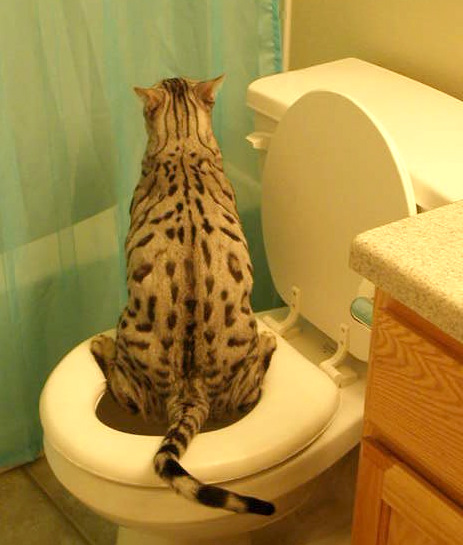Why You Shouldn't Flush Cat Poop Down Your Toilet - Preserve Your Plumbing System
Why You Shouldn't Flush Cat Poop Down Your Toilet - Preserve Your Plumbing System
Blog Article
Listed here in the next paragraph you can get some good tips with regards to Can You Flush Cat Poo or Litter Down the Toilet?.

Introduction
As pet cat owners, it's vital to be mindful of how we take care of our feline pals' waste. While it may appear hassle-free to purge pet cat poop down the commode, this practice can have destructive repercussions for both the setting and human health.
Ecological Impact
Flushing feline poop presents harmful microorganisms and parasites into the water, presenting a considerable risk to water ecosystems. These contaminants can negatively impact marine life and compromise water top quality.
Health and wellness Risks
Along with ecological worries, flushing cat waste can also pose health threats to human beings. Pet cat feces might consist of Toxoplasma gondii, a parasite that can trigger toxoplasmosis-- a possibly severe disease, particularly for pregnant females and people with weakened immune systems.
Alternatives to Flushing
Thankfully, there are safer and more liable ways to take care of cat poop. Take into consideration the complying with alternatives:
1. Scoop and Dispose in Trash
The most usual technique of throwing away cat poop is to scoop it into an eco-friendly bag and toss it in the trash. Make sure to utilize a devoted trash scoop and take care of the waste without delay.
2. Usage Biodegradable Litter
Select eco-friendly pet cat litter made from materials such as corn or wheat. These trashes are eco-friendly and can be safely gotten rid of in the trash.
3. Hide in the Yard
If you have a yard, consider burying feline waste in an assigned location away from veggie yards and water resources. Make certain to dig deep adequate to stop contamination of groundwater.
4. Mount a Pet Waste Disposal System
Purchase an animal waste disposal system specifically designed for pet cat waste. These systems use enzymes to break down the waste, reducing smell and ecological effect.
Conclusion
Responsible animal possession prolongs beyond offering food and sanctuary-- it also involves appropriate waste management. By avoiding flushing cat poop down the commode and choosing different disposal techniques, we can decrease our environmental footprint and shield human health and wellness.
Why Can’t I Flush Cat Poop?
It Spreads a Parasite
Cats are frequently infected with a parasite called toxoplasma gondii. The parasite causes an infection called toxoplasmosis. It is usually harmless to cats. The parasite only uses cat poop as a host for its eggs. Otherwise, the cat’s immune system usually keeps the infection at low enough levels to maintain its own health. But it does not stop the develop of eggs. These eggs are tiny and surprisingly tough. They may survive for a year before they begin to grow. But that’s the problem.
Our wastewater system is not designed to deal with toxoplasmosis eggs. Instead, most eggs will flush from your toilet into sewers and wastewater management plants. After the sewage is treated for many other harmful things in it, it is typically released into local rivers, lakes, or oceans. Here, the toxoplasmosis eggs can find new hosts, including starfish, crabs, otters, and many other wildlife. For many, this is a significant risk to their health. Toxoplasmosis can also end up infecting water sources that are important for agriculture, which means our deer, pigs, and sheep can get infected too.
Is There Risk to Humans?
There can be a risk to human life from flushing cat poop down the toilet. If you do so, the parasites from your cat’s poop can end up in shellfish, game animals, or livestock. If this meat is then served raw or undercooked, the people who eat it can get sick.
In fact, according to the CDC, 40 million people in the United States are infected with toxoplasma gondii. They get it from exposure to infected seafood, or from some kind of cat poop contamination, like drinking from a stream that is contaminated or touching anything that has come into contact with cat poop. That includes just cleaning a cat litter box.
Most people who get infected with these parasites will not develop any symptoms. However, for pregnant women or for those with compromised immune systems, the parasite can cause severe health problems.
How to Handle Cat Poop
The best way to handle cat poop is actually to clean the box more often. The eggs that the parasite sheds will not become active until one to five days after the cat poops. That means that if you clean daily, you’re much less likely to come into direct contact with infectious eggs.
That said, always dispose of cat poop in the garbage and not down the toilet. Wash your hands before and after you clean the litter box, and bring the bag of poop right outside to your garbage bins.
https://trenchlesssolutionsusa.com/why-cant-i-flush-cat-poop/

I am very interested by Can You Flush Cat Poo or Litter Down the Toilet? and I'm hoping you liked our blog entry. Are you aware of anybody else who is occupied with the subject? Please feel free to share it. Thanks for your time. Visit us again soon.
Book With Us Today! Report this page